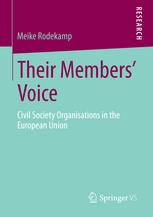

Most ebook files are in PDF format, so you can easily read them using various software such as Foxit Reader or directly on the Google Chrome browser.
Some ebook files are released by publishers in other formats such as .awz, .mobi, .epub, .fb2, etc. You may need to install specific software to read these formats on mobile/PC, such as Calibre.
Please read the tutorial at this link: https://ebookbell.com/faq
We offer FREE conversion to the popular formats you request; however, this may take some time. Therefore, right after payment, please email us, and we will try to provide the service as quickly as possible.
For some exceptional file formats or broken links (if any), please refrain from opening any disputes. Instead, email us first, and we will try to assist within a maximum of 6 hours.
EbookBell Team

4.7
66 reviewsThe role of civil society organisations in Brussels is debated. Some view them as representatives of their members and thus as legitimising agents for policy-making in the European Union. Others see them as being elitist and out of touch with their membership bases, therefore ill-suited to promote democracy at the EU level. Taking civil society organisations in the EU’s external relations as an example, Meike Rodekamp submits these controversial views to a reality check. Interviews with representatives of civil society organisations in Brussels and their member organisations in the EU show that the Brussels offices have not lost contact with their members. However, member organisations differ substantially in their participation in internal decision-making processes, which raises doubts about the legitimacy gains through civil society participation in EU policy-making.